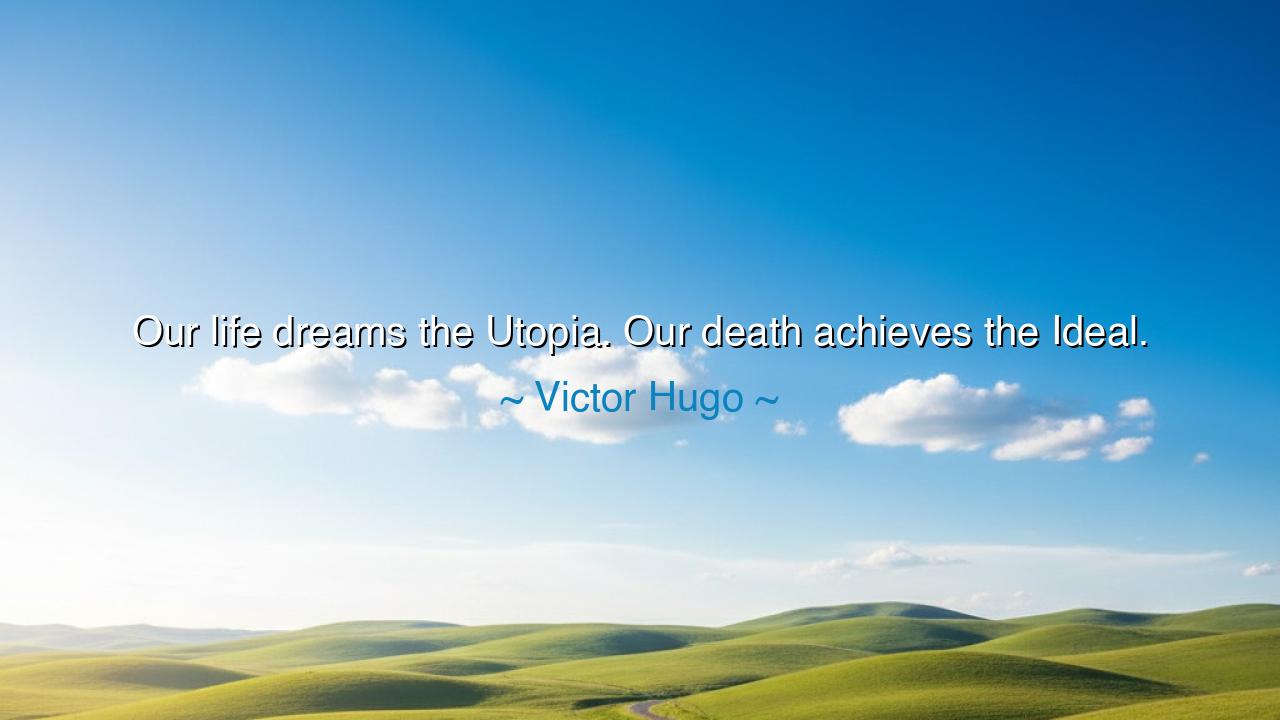
Our life dreams the Utopia. Our death achieves the Ideal.






“Our life dreams the Utopia. Our death achieves the Ideal.”
Thus spoke Victor Hugo, the poet of light and shadow, the voice that sang of the wretched and the divine alike. In this saying, Hugo offers a truth wrapped in both sorrow and glory: that the human spirit, while bound by the limits of flesh and time, forever reaches toward the eternal, toward perfection, toward the Ideal that no earthly hand can fully touch. Life, he says, is the dream — the striving, the yearning, the unfulfilled vision of what might be. But in death, the soul passes beyond striving, and there, it meets the fullness of what it sought — the Ideal realized at last.
In every beating heart lies a Utopia, a vision of a better world. Some dream of peace, others of justice, of love unbroken, of beauty unmarred by decay. Yet all who live know that these dreams, however radiant, are never wholly attained upon the earth. The Utopia remains a vision, shimmering like a mirage just beyond the horizon. And yet, Hugo tells us, it is not futile to dream. For in the dreaming itself — in the endless pursuit of what is right and noble — humanity becomes divine. The Ideal is not born of ease, but of struggle; it is not captured in life’s fleeting days, but sealed in the eternal beyond.
Consider the life of Joan of Arc, that humble maiden who dared to dream of a France united and free. In her life, she dreamed the Utopia — a kingdom saved from tyranny, a people redeemed. She led armies not with sword alone but with spirit, her courage a flame that burned through fear. Yet the world, blind and cruel, bound her to the stake. Her body perished in fire, but in her death, she achieved the Ideal — sainthood, immortality, the triumph of spirit over flame. The Utopia she dreamed was denied her mortal hands, but death crowned her vision with eternal truth.
So it is with all who walk the path of meaning. The artist who paints beauty that none may fully see, the thinker who speaks truth that the age cannot bear, the dreamer who toils for justice and falls before the work is done — they all share the same destiny. Their life dreams; their death fulfills. For no effort born of love or hope is lost; it transforms, transcends, and becomes part of the great eternal design. Hugo, who wrote Les Misérables, saw this clearly — that human life, with all its pain and imperfection, is the seedbed of something divine.
This saying also carries a deeper whisper: that death is not defeat, but completion. The ancients understood this well. The philosopher Seneca said, “He who learns how to die, unlearns how to be a slave.” In releasing our fear of ending, we begin to see that what we build, love, and dream in life does not die with us — it is carried forward, purified by time. Our mortal years are the forge; our death, the moment when the iron of our deeds cools into shape. The Ideal, then, is the eternal echo of our earthly song.
Let every soul, therefore, live as a dreamer of Utopia. Dream not in vain pleasure, but in noble purpose. Strive to create a world where compassion outweighs cruelty, where justice outshines pride, where the flame of goodness burns bright against the dark. Know that you may not see the fruit of your labor, but it is not wasted. As Hugo’s own life teaches, the dream of one generation becomes the Ideal of the next. Every step taken in faith, every act of courage, becomes part of humanity’s long ascent toward the light.
And when the final hour comes — as it must for all — greet it not with fear, but with reverence. For in that passage, your dream will meet its fulfillment, your life’s striving will find its peace. The Utopia you imagined will, in the silent halls of eternity, become the Ideal you helped to build. So live, dear one, as both builder and believer, as dreamer and doer — for though your hands are mortal, your vision is immortal. Life dreams the Utopia; death achieves the Ideal — and together, they weave the eternal destiny of humankind.






AAdministratorAdministrator
Welcome, honored guests. Please leave a comment, we will respond soon